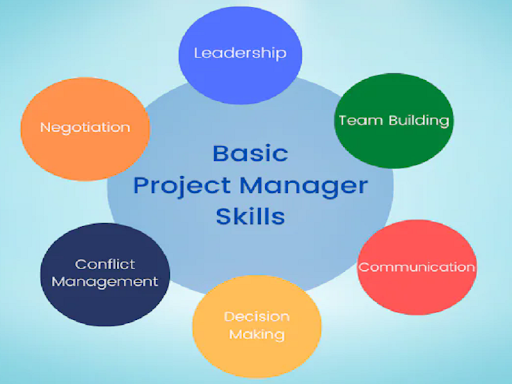Basic project management skills

Basic project management skills
Project management skills are essential competencies required to effectively guide a project from inception to completion. These abilities are pivotal in ensuring a project’s progression with greater efficiency and effectiveness.
Enhancing your project management skills can positively influence your team’s performance, regardless of your specific role, directly contributing to the successful completion of a project.
In the following discussion, we delve into the top 15 skills that are indispensable for every project manager.
What are project management skills and why do they matter?
Project management is a critical and complex discipline that plays a vital role in the success of a wide range of initiatives across various industries.
At its core, project management is the art and science of organizing and managing resources in a way that ensures a project is completed within defined scope, quality, time, and cost constraints.
It involves a series of processes and activities, ranging from the initial conception of a project to its completion and delivery.
This practice is characterized by its focus on achieving specific objectives, whether they involve constructing a building, implementing a new business process, developing a new product, or any other endeavor with a defined start and end point.
Each project is unique and requires a tailored approach to its management, making the role of a project manager both challenging and dynamic.
15 Basic project management skills

The basic skills to learn in project management include:
1. Communication in project management
Effective communication is a fundamental skill for project managers. It is crucial for conveying messages clearly and effectively to clients and team members. This skill enables project managers to articulate their vision, goals, ideas, and any challenges they encounter.
Additionally, strong communication skills are essential for creating compelling presentations and comprehensive reports, tools that are vital for the successful management and execution of a project.
2. Leadership in project management
Leadership is an indispensable skill for project managers. It empowers them to effectively oversee and coordinate tasks, while also providing the motivation and guidance needed to inspire their team.
A project manager with strong leadership abilities can create a clear roadmap for the project, ensuring that the team works cohesively and efficiently towards successful completion.
3. Organization in project management
Organization is a key skill for project managers, vital for ensuring that processes run smoothly and align with overarching goals.
This skill encompasses more than just the ability to multitask; it involves the prioritization of tasks, effective compartmentalization of various project components, and meticulous documentation.
Such organizational prowess enables project managers to manage their tasks efficiently, keep track of progress, and maintain easy access to information for future reference.
4. Negotiate in project management
In the realm of project management skills, the ability to negotiate skillfully is crucial. Project managers must adeptly negotiate with suppliers, clients, and other key stakeholders to align terms beneficially.
Moreover, these negotiation skills are not just outward-facing; they are equally important when dealing internally with the team.
5. Team management in project management
Among the basic tools of project management, the capacity for adept team management stands out as essential.
A project manager needs to have the ability to unify a team, steering them towards a common direction while aligning their individual goals with the organization’s objectives.
This aspect of team management entails effective delegation of responsibilities, resolving conflicts, evaluating team performance, and coaching members to enhance their skills.
6. Time management in project management
Project managers are required to develop a detailed project timeline, ensuring that all deadlines are realistically set and consistently met throughout the project’s lifecycle.
This skill is essential in keeping the project on track and ensuring timely completion.
7. Risk management in project management
In the domain of project management skills, the ability to manage risks effectively is paramount. Project managers need to have a keen eye for identifying potential risks that might not be immediately obvious.
Their expertise should extend to formulating and executing strategies to mitigate these risks. This necessitates probing their team with incisive questions and continuously validating timelines, decisions, and dependencies.
Moreover, a project manager should be adept at using specialized risk management tools, which are instrumental in analyzing and strategizing against potential risks, ensuring the project’s stability and success.
8. Problem-solving in project management
Among the basic skills to learn in project management, strong problem-solving capabilities are essential.
A project manager should possess the ability to collect and analyze information, carefully consider the advantages and disadvantages of each scenario, and then craft the most effective solution.
Possessing robust problem-solving skills enables a project manager to adopt a systematic approach towards resolving issues, leading to favorable outcomes in the project’s progression.
9. Budget management in project management
In the context of basic project management terms, budget management stands out as a pivotal responsibility of a project manager.
It involves creating a feasible budget and meticulously controlling it throughout the project’s lifecycle. Effective budget management requires experience to identify areas of cost overrun and to determine necessary adjustments for cost control.
This skill encompasses the ability to monitor expenses, manage spreadsheets, and make informed decisions regarding the allocation of the budget, ensuring that funds are spent judiciously.
10. Technical writing in project management
In the array of project management skills, technical writing is a critical component. It is a style of writing focused on taking complex, high-level details and distilling them into clear, easily understandable formats.
Project managers frequently employ this skill when drafting deliverables, distributing memos, announcing product releases, or sending news updates.
11. Adaptability in project management
Incorporating adaptability into the framework of basic project management skills is crucial. Adaptability refers to the ability to seamlessly adjust to changing circumstances, such as evolving product trends, new technological advancements, and shifting user demographics.
For project managers, this skill is especially important at a material level, as they are responsible for guiding entire teams through these changes.
12. Technical skills in project management
In the context of basic knowledge of project management, having robust technical skills is a key asset. These skills are developed through hands-on experience with physical or digital tasks. A project manager who is proficient in current technologies can significantly enhance team productivity.
This proficiency is not just about being tech-savvy; it’s about leveraging this expertise to streamline processes, thereby boosting output and the team’s overall efficiency in executing tasks.
13. Reporting skills in project management
Among the project manager basic skills, proficient reporting abilities are essential. A project manager should be adept at collecting information throughout the project’s lifespan and preparing reports for future evaluation, a practice that becomes particularly crucial when a project encounters challenges.
Reporting skills are not just about documenting; they involve effective coordination with managers, clients, and team members.
This includes setting clear expectations and objectives, as well as communicating pertinent information about deliverables.
14. Research skills in project management
In the sphere of basic project management techniques, research skills play a pivotal role. These skills enable a project manager to effectively seek answers to questions and solutions to problems that arise during the course of a project.
The ability to conduct thorough research helps in bridging knowledge gaps, thus equipping the project manager with the necessary insights to complete the project with greater efficiency and success.
15. Project management methodologies
Understanding and applying project management methodologies is a cornerstone in the basics of good project management. These methodologies comprise a systematic set of processes designed to manage and execute large-scale tasks effectively.
They play a crucial role in structuring, standardizing, and organizing the methods used for project execution.
A proficient project manager must possess the ability to implement various frameworks and methodologies, like Agile and Scrum, across different stages of a project’s life cycle.
This skill is vital for ensuring that projects are managed in a consistent, efficient, and adaptable manner, aligning with the principles of good project management.
Conclusion
In conclusion, while the mastery of various skills is crucial for effective project management, improving your project management skills is an ongoing process.
To further enhance these capabilities, the integration of project management software can be transformative.
Atwork Project Management Software stands out as a prime example of such a tool. It is meticulously designed to complement and elevate your management skills, providing a comprehensive platform for organizing, tracking, and optimizing your project workflow.
This software encompasses features crucial for every aspect of project management, from time and budget tracking to fostering effective team collaboration and robust reporting.
If you wish to use this tool, please refer to your user panel at the top of the page.